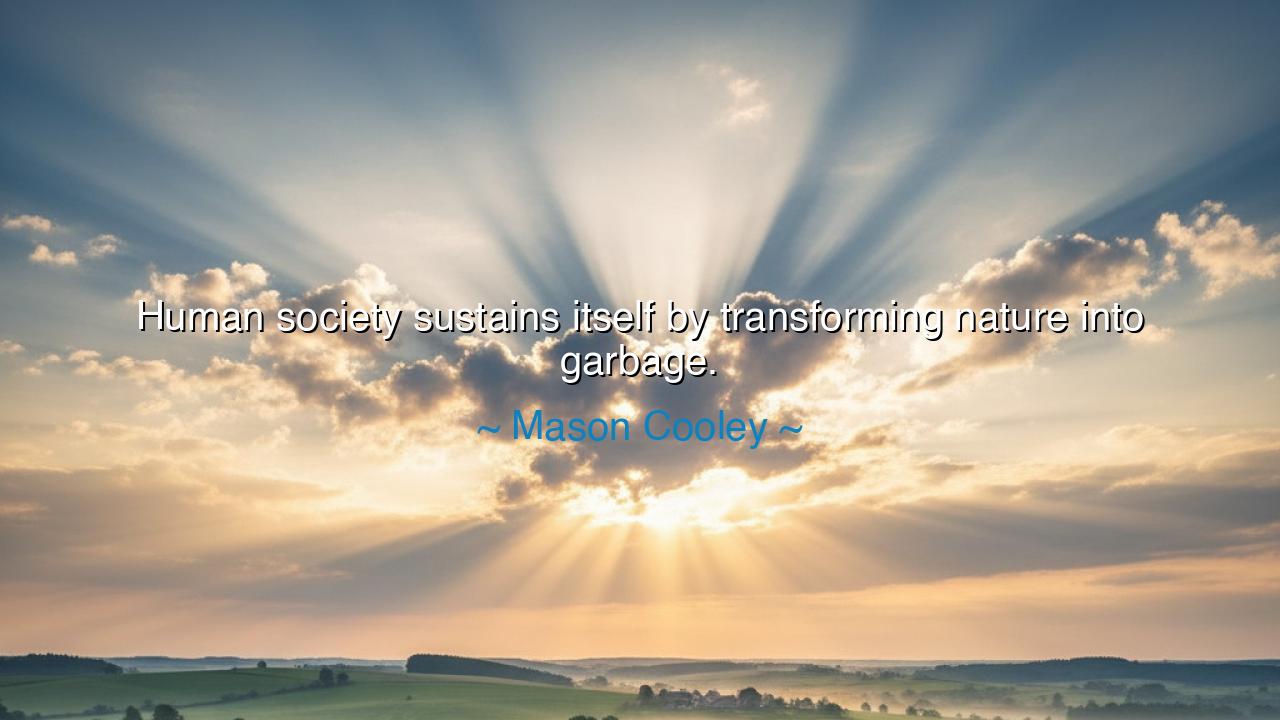
Human society sustains itself by transforming nature into






The words of Mason Cooley, “Human society sustains itself by transforming nature into garbage,” strike with the weight of both accusation and prophecy. In this single line, the mirror is held to the face of civilization, and what stares back is both our glory and our shame. For it is true: from the forests we cut, from the rivers we dam, from the stones we break, humanity builds its cities, feeds its nations, and clothes its people. Yet with every act of creation comes the shadow of destruction: the garbage that chokes the earth, the remnants of our hunger, the evidence of our excess. The quote reveals not only the truth of our sustenance, but the tragic irony that life itself, as we have chosen to live it, is entangled with waste.
To understand this saying, we must go back to the ancient bond between humankind and the earth. Once, the tribes of old moved lightly upon the land. The hunter took only what was needed, and the gatherer left roots in the ground that they might bloom again. In those days, the cycle was whole, and nature remained a mother who replenished what was taken. But with the rise of empire and machine, the balance shifted. Humanity learned not only to harvest, but to exploit, and in that power forgot reverence. The soil was tilled beyond its strength, the forests felled without renewal, the seas emptied with unrelenting nets. The harmony of transformation gave way to the tyranny of extraction, and the world began to drown beneath the refuse of progress.
Consider the cautionary tale of Easter Island. Its people, seeking to honor their gods, carved towering statues from the stone. Yet to move these giants, they cut down their forests, tree by tree, until none remained. With no trees, their soil eroded, their food grew scarce, and their civilization collapsed into hunger and war. Here, too, we see Cooley’s warning: a society that sustains itself by consumption without restraint will one day be consumed by its own garbage. The broken statues that now litter the island stand not only as monuments to ambition, but as gravestones of folly.
And yet, the story is not only ancient; it is our present. The air of cities grows heavy with smoke; the oceans groan beneath plastic; the landfills rise like man-made mountains. Each new invention, each packaged convenience, each gleaming tower is built upon the quiet transformation of nature into waste. We glorify progress, yet avert our eyes from the trails of broken rivers, poisoned fields, and extinct creatures left behind. Cooley’s words are not an observation of the past alone—they are the grim chorus of our modern world.
But despair is not the end of wisdom. For in recognizing the shadow, we are called to turn toward the light. If humanity sustains itself by transforming, then let us transform differently. Let our arts and sciences be bent toward renewal rather than ruin. Let us remember that the farmer can nourish the soil as well as exhaust it, that the builder can raise homes without scarring the sky, that the craftsman can fashion goods that endure, not decay into waste within days. Transformation is not evil—recklessness is.
What lesson, then, should we take? That every act of consumption is also a moral choice. To walk upon this earth is to leave footprints, but we may choose whether they sink as scars or bloom as gardens. Begin with simple acts: refuse what is needless, repair what is broken, and cherish what endures. Plant trees where forests have been cut. Support crafts and trades that honor the cycle of life. Teach children not only to count their wealth, but to measure their impact upon the world.
The ancients would say: “You are not masters of the earth, but stewards.” Cooley’s words remind us that if we see the earth only as fuel, we will be left with ashes. But if we honor her gifts, then transformation may yet become not the making of garbage, but the making of abundance. The choice lies before us, as it has lain before all peoples. And the wise will choose reverence, for in reverence there is survival, and in survival there is the hope of a future worthy of our children.






AAdministratorAdministrator
Welcome, honored guests. Please leave a comment, we will respond soon